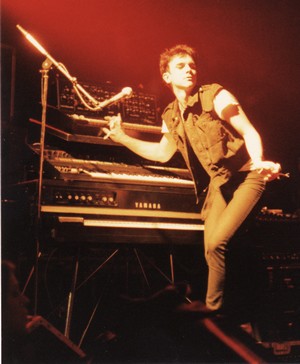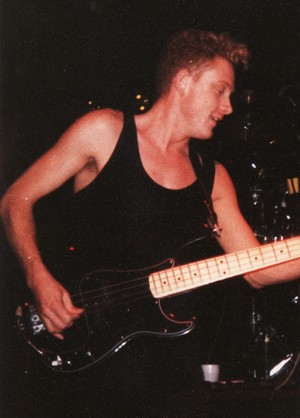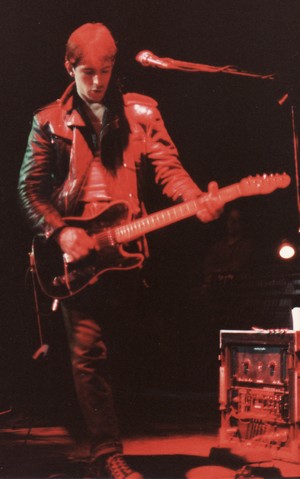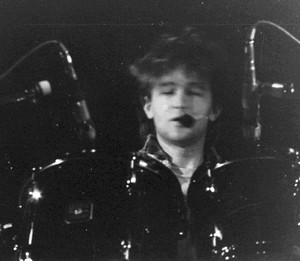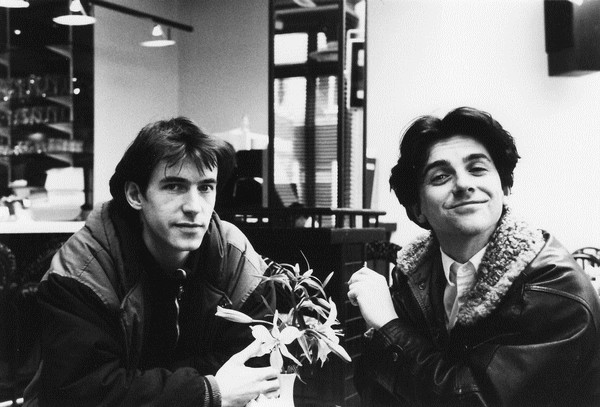A Euros Fan Forever...
Recollections
from Inge Kuijt
I met Inge after Steve’s ‘h band’ Dingwalls
shows way back in 2000! She was kind
enough to send over some photos, and photocopies of
articles from her extensive Europeans
scrapbook. I posted a handful of her
exclusive photos on the Gigs pages over 10 years ago, and have
now updated the page with the full sets of gig shots. I have added edited excerpts to the gig page
also, but thought Inge’s
full text deserves a page of its own.
First up is the story of her love for the band, followed by a piece on
how the press gave the band a hard time.
Many, many thanks to Inge for all her recollections, and apologies for not
‘publishing’ them on the site sooner!
A Fan
Forever
by
Inge Kuijt
(The article below was written in 1992. I had
become good friends with Isabelle, the girl who ran the French Marillion fan
club. For her magazine, Blue Angel, she asked me to try and put into words what
was so special about Europeans and
why I loved them so much. Here is what I wrote.)
Hello, I am Inge and I’m unique.
At least, that’s what Isabelle tells me, and she’s asked me to write about my ‘adventures’
and explain my uniqueness.
Some 8 years ago, on 11 February 1984 to be precise, I was
shopping in town with my friend Ciska, when we walked
past our local venue (in Delft, Holland, for that’s where this story begins)
and we saw this very large, very yellow poster of 4 very good-looking blokes.
It turned out they were playing a concert there that night and we instantly
decided, ‘this we have to see!’. We ran to the nearest record shop and bought
a 12-inch single, which we played for the rest of the afternoon, so we would be
able to sing along to a few songs at least. The 12-inch was American People,
the four ‘pretty boys’ were Europeans.
The gig was amazing and in retrospect it is important to me,
because it was the start of a lot of very exciting things. For one thing, if I
hadn’t been at that gig, I would not be writing for the Blue Angel now.
About 50 people had had the same idea we had, and although
this of course was a small crowd we apparently all decided to make something of
this gig. My friend Ciska and I were at the front,
and after about two songs we got into the grip of the music and we danced and
danced until we almost dropped down dead. Europeans
had just released their LIVE album the month before and they played all
of it. The stage was pretty small, so the band didn’t have a lot of room to
move about, but it created a very intimate atmosphere.
The sheer energy of the performance was overwhelming. A few
times during the concert I looked at Ciska and she
looked so happy, so excited and thrilled, as if she was having a most unusual
experience. And then I realised I must look the same, because I knew what it
was she felt.
The band saw it, too. About 15 minutes after the last encore
was over we were leaning on the stage, trying to get our breath back and
telling each other how brilliant this gig had been. A roadie came out of the
dressing room and walked up to us, and kindly invited us to come in and talk to
the band. Well, this was an invitation we most gladly accepted.
The four Europeans
were nice, friendly and interested. They fetched us chairs and gave us drinks
and then started to cross-examine us. Did we like the gig (yes, very much), had
we heard of them before (yes, in fact, we had. Ciska
had even seen them play at the anti-nuke demonstration in The Hague in October
1983), did we have any records (yes... well, one), would we like to come
tomorrow as well, in Amsterdam (oh, yes!), could they have our names so
they could put us on the guest list (most definitely yes!), etc. etc.
I had spoken to several bands before, but this was quite a
new approach and it worked. Not only had I witnessed what I thought was one of
the most exciting, danceable and wonderful musical events of the year, we were
also given the phone number of their Amsterdam hotel and asked to call them the
next morning, so we could meet somewhere and do something together in the
afternoon. ‘One last thing,’ I said, ‘that song you played twice, once in the
actual set, once as an encore, what was it called, I really liked it.’ ‘She
noticed! She noticed we played it twice, you’ve really listened!’ It was called
Falling and it’s still one of my favourites.
The next day the sun was shining (on 12 February?) and it
was warm outside, so of course nobody was at the hotel when we phoned, but we
decided to go to Amsterdam early anyway. We found them having a drink at a
pavement café on the Leidseplein. A
happy reunion. We joined them, at first outside, then at the bar inside
for a cup of hot cocoa and a lot of laughs. The gig that night was even better
than the previous one in Delft, or was this just because I already had an inkling that they would become ‘my band, for now and for ever’?
Two days later I wrote a letter to Steve (he was my ‘hero’ from the start) and about a week later he
wrote me back, telling me not to spend all my money on Europeans. I am sorry to say that I
disobeyed him, for within a few days I bought both albums and three 12-inches.
After those two days in February, my life began to revolve
around the band more and more. In July I went to London for a few days with a
friend. We dropped in at the Europeans’
manager, hoping to hear some interesting news, or maybe the manager would tell
us they were playing that week. No, they weren’t, they were in fact recording
their new album in Wales. ‘But I can get you someone on the phone,’ he said,
and he rang the studio in Wales. Before I knew it, I was handed the phone and
heard Geoff’s voice on the other end
telling me how the recording was going... Cool!
No gigs in July then, but there was one in October in
England (where they played on the south coast and afterwards gave us a 1.5 hour
lift back to London in their van), 4 times in Germany at the end of November,
and finally 3 times in London for Christmas. Busy, busy. Eight concerts in 2.5
months, but they were the most thrilling of my life. I breathed Europeans, they were
the centre of my life. I loved their records, their concerts and them.
It was too good, it just couldn’t last. And it didn’t, they
split up, and I nearly died of a broken heart. Never to see singer Ferg climb the speakers in Falling
again (where do you think Steve got
the idea for Incommunicado?), never to look into guitarist Colin’s beautiful eyes again, never
grin at little-drummer-boy Geoff’s
jokes again, and never be run over again by Steve being completely out of control, throwing down 20 microphone
standards within 5 minutes. It was a horrible and unthinkable idea. Something
broke and the fairy-tale was over. Back to real life, school,
study and normal existence. Yuck!
Some year and a half later I accidentally discovered a small
advertisement in an English music magazine, which read: How
We Live are Steve Hogarth
and Colin Woore. Their new single is
called ‘Working Town’.
Things picked up. I wrote letters again, but unfortunately
never got to see them play. Afterwards I heard they played in Holland as
support act to Chris de Burgh, but I didn’t know then.
In 1988 I paid a visit to the management in London again and
said I would really like to see Steve
if possible. A meeting was set up for a few days later and to my great surprise
I found both Steve and Colin waiting for me, and we went to a bar
for a drink and had a good chat in which Steve
told me that ‘he was pregnant’.
Well, history repeats itself. How
We Live also stopped, but as you all know, Steve turned up again, this time as singer of Marillion. So I’ve
stopped worrying. Whatever happens, it will be alright again. I still have one
fourth of the band left and all of the music, and I’ve gained Marillion. I
can’t complain. Yet I wish I could see the other three Europeans
again, too.
Europeans
to me always had a kind of magic (a combination of talent, enthusiasm and lots
of sweat) and even though their records may sound a little out-dated today, listen
to them if you have a chance. Maybe you can feel a little of it, too.
P.S. in 2008:
Hoorah! I did see them all again. In 2000 Steve played a solo gig in Dingwalls, and the other three Europeans were in the audience. In fact, I
was very happy to see Colin mount
the stage during the soundcheck and hear some How We Live
music played live for the first time ever!
Afterwards they all posed for a Europeans reunion photo. It was just lovely to
meet them again after all those years. At that time there was some talk of a
possible Europeans
reunion gig, but I suppose that idea just vanished into thin air. Too bad.
The Press and the Bible
by
Inge Kuijt
(This article was
published in the spring 1992 edition of the Dutch Marillion fan club magazine.)
In 1974 three Scottish boys, 13 years old, decide to start a
band. Ferg Harper
on bass and vocals, Geoff Dugmore on
the drums and Colin Woore on guitar.
Six years later, much to the amusement of their families, they decide to try
their luck in London. An
ad in Melody Maker results in a keyboard player, Steve Hogarth, the only non-Scot in what is now called Europeans. A record deal is signed with A&M
records and early 1982 the first single The Animal Song is released. In
those days Europeans are fascinated by
their outward appearance. They can be seen on tv dressed in a kind of white ballet suits, with
white face masks, and they try to look terrible athletic. It's all to no avail,
The Animal Song isn't doing anything (except in Hong Kong where it is
fast becoming an enormous dance hit.)
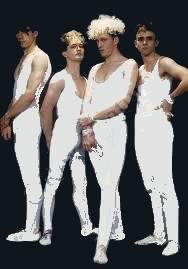
One of the reasons for this lack of success is that Europeans are truly hated by the British
music press. They try to destroy the band in every which way they can. In 1983
a Sounds journalist writes a long article in which he closely follows Europeans’ first and only American tour.
He accuses the band of all sorts of things: their only criterion for judging a
gig to be successful is whether people were dancing or not, their enthusiasm is
forced and fake, and they shout into the microphone every 5 minutes: ‘Are you
having a good time?’ No, says the journalist, if Europeans
wouldn't behave so unnaturally forced and ridiculous, they might actually go
places, but the way things are now, he would prefer to go and see another band.
A month later there's an article in Melody Maker, written
during a visit to Holland. Europeans
have just played at the massive anti-nuke demonstration in The Hague, and in
the evening they do a gig at the Rotterdam Arena, for no more than about 50
people. The reason for this is not that people aren't interested, but that the
entire Dutch railways system is blocked because of the huge crowd that went to
the demonstration and is now trying to go home. Rotterdam people that were out
of town are unable to return, and fans and other interested people cannot get
to Rotterdam by train either. This is the kind of back luck that Europeans always seem to be having, says Steve. ‘About six months after we got
our contract, everything went wrong. We were our own manager, and we just
drifted here and there, without any direction. A&M didn't provide any guidance
either, not that we would have followed that anyway. We are just very stubborn,
we do what we want. After 3 months we found a manager who actually likes our
music and who has the right experience.’
Times change and things are improving. Another journalist
writes, ‘the white suits and masks are gone. They are now more like themselves,
they seem more natural and this can be heard in the music. The on-off
extremities of their earlier work have been replaced by more melodic
compositions that make you think.’ You can say that again, Europeans
are back with a vengeance. Take the song Writing for Survival from the
Recurring Dreams album. In it the music press is hit hard. ‘In that song we
have aimed fire at the British press,’ Steve
tells Stic magazine in March 1984. ‘They are always
quite vicious when it comes to us. Don't ask me why, but they simply don't like
us. We are not original, according to them. They hate everything about us and
if they get a chance, they come down on us. In Writing for Survival we
make clear that pop journalists write in order to eat. Most people don't seem
to realise that. To a lot of people a music magazine is like the Bible. What a
lot of nonsense, a music mag is just part of the
commercial market.’ And, ‘apparently everything about us is wrong. Our name
doesn't mean anything. But I think Europeans
is a great name because it’s ‘big’ and it holds no specific ideas or
connotations, which means that we can always keep evolving musically. I see us
as a band that writes songs, of which some are bloody good dance tunes.’
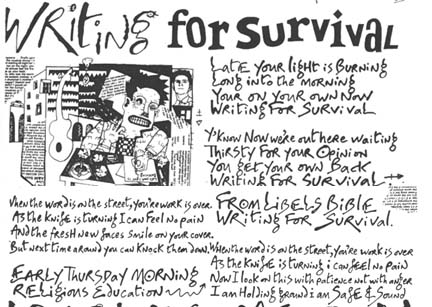
OK, not all journalists are prejudiced. There's one who
writes, ‘excellent use of melody, heavenly harmonies, and some quite stunning
guitar work. Especially when they slow down the pace a bit and leave more room for
emotion, they show some glimpses of perfection, such as in Going to Work.’
This is the first Europeans song that has come out of Steve's head, and it can be found on the first album Vocabulary.
Many of the slower songs that follow after were written by him. He also thinks
the band has changed. ‘In the beginning we used to think a lot about what to
play so that people would like us. What would they like to hear, what are we
doing wrong, why don't they like us? Now we don't worry about that anymore, we just
play the music we like, and if people don't want it, well, too bad, but we're
not going to adapt ourselves to that any more.’
Europeans
certainly changed during their four-year existence. Their first songs are undoubtedly
fast, danceable, rocking, loud, up-tempo and busy. In the studio it's not
really coming to life. Europeans
are a band you have to see, to feel. Gallons of sweat fly through the air
during the last songs of any Europeans
concert. Not only the band's sweat, the audience's sweat as well. You can
almost hear that sweat on the LIVE album which is released early 1984. From
that moment on things are moving. Not that their singles are now selling like
hot cakes, but the concerts draw a larger crowd, and nearly every visitor
leaves as a fan.
In order to promote the second studio album Recurring Dreams
the record company releases, at the band's request, 50,000 free
‘try-it-out-for-yourself singles’. ‘Bribery,’ says the press. On one side of
the single there's Acid Rain, very beautifully sung by Steve, the b-side is filled by snatches
of three different tracks. When the album sees the light of day not long after,
it is sold reasonably well and the band set out on a long tour again. Germany
is conquered and Christmas is celebrated by three sparkling concerts in London,
which ‘everyone who is someone’ in England seems to attend. It is starting to
look as if Europeans are going to break
the enemy lines. And then suddenly, silence – much silence – an extended silence
– and then, nothing. Europeans
are no more. ‘Didn't we tell you? Ha!’ the British music press must have
thought.
